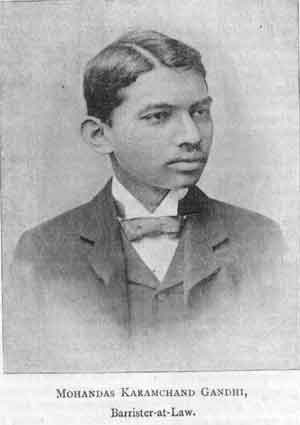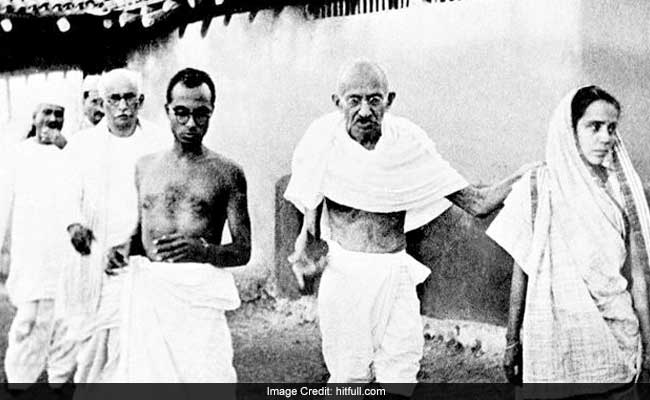Mahatama Gandhi (Arun.Noutiyal writter )
Born
Mohandas Karamchand Gandhi was born on 2 October 1869 into a Gujarati Hindu Modh Baniya family in Porbandar (also known as Sudamapuri), a coastal town on the Kathiawar Peninsula and then part of the small princely state of Porbandar in the Kathiawar Agency of the Indian Empire. His father, Karamchand Uttamchand Gandhi (1822–1885), served as the diwan (chief minister) of Porbandar state.
Early life and background
Although he only had an elementary education and had previously been a clerk in the state administration, Karamchand proved a capable chief minister. During his tenure, Karamchand married four times. His first two wives died young, after each had given birth to a daughter, and his third marriage was childless. In 1857, Karamchand sought his third wife's permission to remarry; that year, he married Putlibai (1844–1891), who also came from Junagadh, and was from a Pranami Vaishnava family.Karamchand and Putlibai had three children over the ensuing decade: a son, Laxmidas (c. 1860–1914); a daughter, Raliatbehn (1862–1960); and another son, Karsandas (c. 1866–1913).
On 2 October 1869, Putlibai gave birth to her last child, Mohandas, in a dark, windowless ground-floor room of the Gandhi family residence in Porbandar city. As a child, Gandhi was described by his sister Raliat as "restless as mercury, either playing or roaming about. One of his favourite pastimes was twisting dogs' ears."[24] The Indian classics, especially the stories of Shravana and king Harishchandra, had a great impact on Gandhi in his childhood. In his autobiography, he admits that they left an indelible impression on his mind. He writes: "It haunted me and I must have acted Harishchandra to myself times without number." Gandhi's early self-identification with truth and love as supreme values is traceable to these epic characters.
English barrister
Gandhi came from a poor family, and he had dropped out of the cheapest college he could afford.[45] Mavji Dave Joshiji, a Brahmin priest and family friend, advised Gandhi and his family that he should consider law studies in London.[46] In July 1888, his wife Kasturba gave birth to their first surviving son, Harilal.[47] His mother was not comfortable about Gandhi leaving his wife and family, and going so far from home. Gandhi's uncle Tulsidas also tried to dissuade his nephew. Gandhi wanted to go. To persuade his wife and mother, Gandhi made a vow in front of his mother that he would abstain from meat, alcohol and women. Gandhi's brother Laxmidas, who was already a lawyer, cheered Gandhi's London studies plan and offered to support him. Putlibai gave Gandhi her permission and blessing.
 On 10 August 1888, Gandhi aged 18, left Porbandar for Mumbai, then known as Bombay. Upon arrival, he stayed with the local Modh Bania community while waiting for the ship travel arrangements. The head of the community knew Gandhi's father. After learning Gandhi's plans, he and other elders warned Gandhi that England would tempt him to compromise his religion, and eat and drink in Western ways. Gandhi informed them of his promise to his mother and her blessings. The local chief disregarded it, and excommunicated him an outcast. But Gandhi ignored this, and on 4 September, he sailed from Bombay to London. His brother saw him off.[47][49]Gandhi attended University College, London which is a constituent college of University of London.
On 10 August 1888, Gandhi aged 18, left Porbandar for Mumbai, then known as Bombay. Upon arrival, he stayed with the local Modh Bania community while waiting for the ship travel arrangements. The head of the community knew Gandhi's father. After learning Gandhi's plans, he and other elders warned Gandhi that England would tempt him to compromise his religion, and eat and drink in Western ways. Gandhi informed them of his promise to his mother and her blessings. The local chief disregarded it, and excommunicated him an outcast. But Gandhi ignored this, and on 4 September, he sailed from Bombay to London. His brother saw him off.[47][49]Gandhi attended University College, London which is a constituent college of University of London. Civil rights activist in South Africa (1893–1914)
In April 1893, Gandhi aged 23, set sail for South Africa to be the lawyer for Abdullah's cousin. He spent 21 years in South Africa, where he developed his political views, ethics and politics.
Immediately upon arriving in South Africa, Gandhi faced discrimination because of his skin colour and heritage, like all people of colour. He was not allowed to sit with European passengers in the stagecoach and told to sit on the floor near the driver, then beaten when he refused; elsewhere he was kicked into a gutter for daring to walk near a house, in another instance thrown off a train at Pietermaritzburg after refusing to leave the first-class. He sat in the train station, shivering all night and pondering if he should return to India or protest for his rights. He chose to protest and was allowed to board the train the next day. In another incident, the magistrate of a Durban court ordered Gandhi to remove his turban, which he refused to do. Indians were not allowed to walk on public footpaths in South Africa. Gandhi was kicked by a police officer out of the footpath onto the street without warning.
Struggle for Indian independence (1915–1947)
At the request of Gopal Krishna Gokhale, conveyed to him by C. F. Andrews, Gandhi returned to India in 1915. He brought an international reputation as a leading Indian nationalist, theorist and community organiser.
Gandhi joined the Indian National Congress and was introduced to Indian issues, politics and the Indian people primarily by Gokhale. Gokhale was a key leader of the Congress Party best known for his restraint and moderation, and his insistence on working inside the system. Gandhi took Gokhale's liberal approach based on British Whiggish traditions and transformed it to make it look Indian.
Gandhi took leadership of the Congress in 1920 and began escalating demands until on 26 January 1930 the Indian National Congress declared the independence of India. The British did not recognise the declaration but negotiations ensued, with the Congress taking a role in provincial government in the late 1930s. Gandhi and the Congress withdrew their support of the Raj when the Viceroy declared war on Germany in September 1939 without consultation. Tensions escalated until Gandhi demanded immediate independence in 1942 and the British responded by imprisoning him and tens of thousands of Congress leaders. Meanwhile, the Muslim League did co-operate with Britain and moved, against Gandhi's strong opposition, to demands for a totally separate Muslim state of Pakistan. In August 1947 the British partitioned the land with India and Pakistan each achieving independence on terms that Gandhi disapproved.
Champaran and Kheda
Champaran agitations
Gandhi's first major achievement came in 1917 with the Champaran agitation in Bihar. The Champaran agitation pitted the local peasantry against their largely British landlords who were backed by the local administration. The peasantry was forced to grow Indigo, a cash crop whose demand had been declining over two decades, and were forced to sell their crops to the planters at a fixed price. Unhappy with this, the peasantry appealed to Gandhi at his ashram in Ahmedabad. Pursuing a strategy of nonviolent protest, Gandhi took the administration by surprise and won concessions from the authorities.
Non-co-operation
With his book Hind Swaraj (1909) Gandhi, aged 40, declared that British rule was established in India with the co-operation of Indians and had survived only because of this co-operation. If Indians refused to co-operate, British rule would collapse and swaraj would come.
Gandhi expanded his nonviolent non-co-operation platform to include the swadeshi policy – the boycott of foreign-made goods, especially British goods. Linked to this was his advocacy that khadi (homespun cloth) be worn by all Indians instead of British-made textiles. Gandhi exhorted Indian men and women, rich or poor, to spend time each day spinning khadi in support of the independence movement. In addition to boycotting British products, Gandhi urged the people to boycott British institutions and law courts, to resign from government employment, and to forsake British titles and honours. Gandhi thus began his journey aimed at crippling the British India government economically, politically and administratively.
Salt Satyagraha (Salt March)
After his early release from prison for political crimes in 1924, over the second half of the 1920s, Gandhi continued to pursue swaraj. He pushed through a resolution at the Calcutta Congress in December 1928 calling on the British government to grant India dominion status or face a new campaign of non-co-operation with complete independence for the country as its goal.After his support for the World War I with Indian combat troops, and the failure of Khilafat movement in preserving the rule of Caliph in Turkey, followed by a collapse in Muslim support for his leadership, some such as Subhas Chandra Bose and Bhagat Singh questioned his values and non-violent approach. While many Hindu leaders championed a demand for immediate independence, Gandhi revised his own call to a one-year wait, instead of two.
Congress politics
In 1934 Gandhi resigned from Congress party membership. He did not disagree with the party's position but felt that if he resigned, his popularity with Indians would cease to stifle the party's membership, which actually varied, including communists, socialists, trade unionists, students, religious conservatives, and those with pro-business convictions, and that these various voices would get a chance to make themselves heard. Gandhi also wanted to avoid being a target for Raj propaganda by leading a party that had temporarily accepted political accommodation with the Raj.
Father of the Nation
Indians widely describe Gandhi as the father of the nation. Origin of this title is traced back to a radio address (on Singapore radio) on 6 July 1944 by Subhash Chandra Bose where Bose addressed Gandhi as "The Father of the Nation" On 28 April 1947, Sarojini Naidu during a conference also referred Gandhi as "Father of the Nation".
Death
30 January 1948, Mahatma Gandhi was shoot by his own disciple, the whole country was in shock.
Last word
Goddess made us free with the help of Sabarmati without free standing.
देदी हमें आज़ाद बिना खड़क बिना ढल साबरमती के संग तुने कर दिया कमाल
contributed by
Arun Noutiyal
MY WEBSITES; biographyofknowledge.blogspot.com
And to know you about your health: guidetopersonality.com
और आपको अपने स्वास्थ के बारे जानने के लिए : guidetopersonality.com




nice
ReplyDeleteNice
ReplyDeleteNice 😎
ReplyDelete